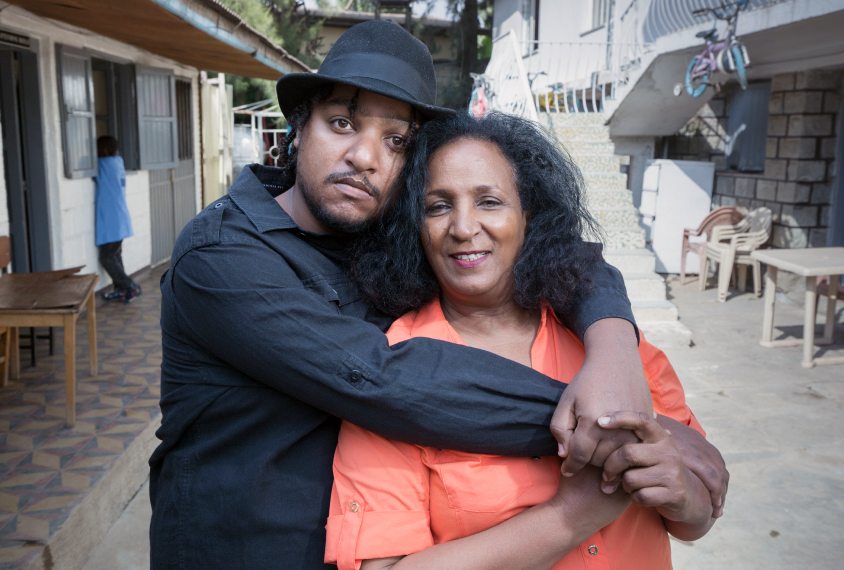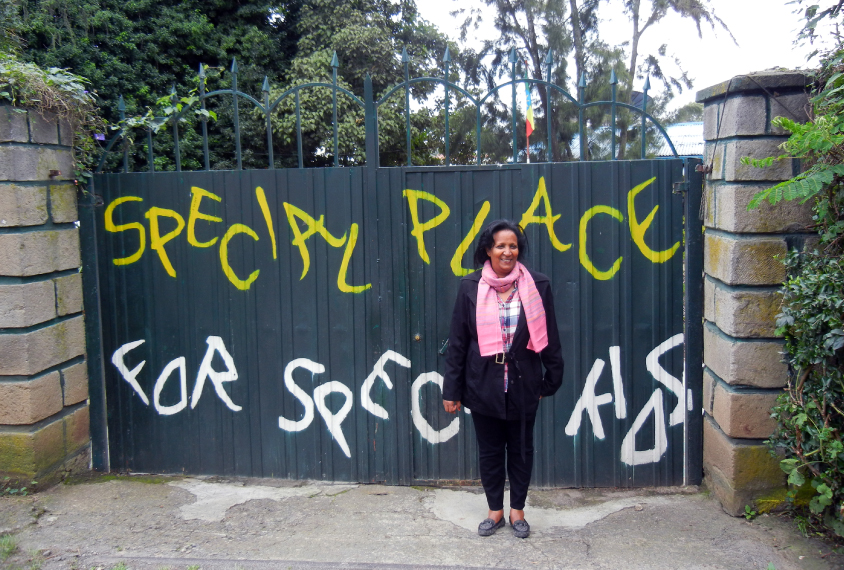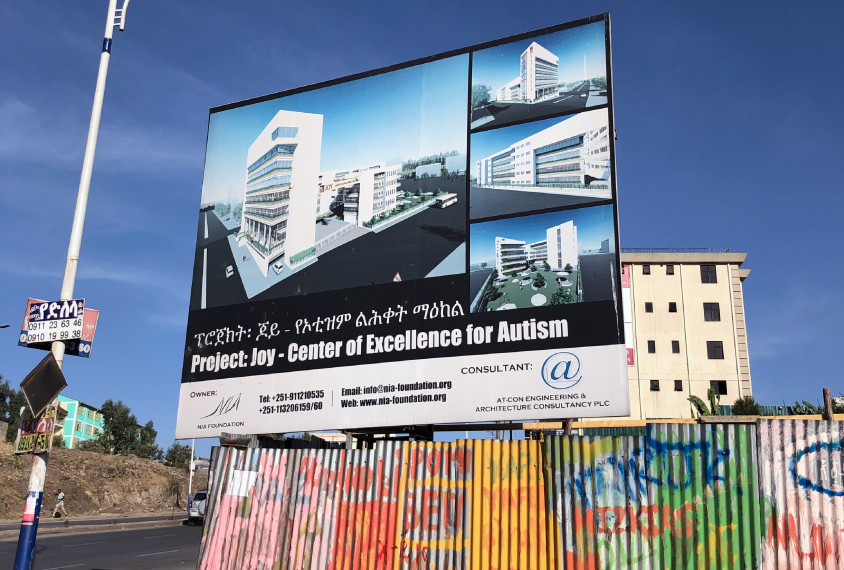Editor’s Note
We are following Ethiopian convention in referring to Zemi by her given name.

Zemi Yenus was the mother of a child with autism, founder of Ethiopia’s first school for autistic children and a tireless advocate for autism awareness and research in Africa.
We are following Ethiopian convention in referring to Zemi by her given name.
Zemi Yenus, a pioneering teacher and advocate for autistic children in Ethiopia, died of COVID-19 on 11 May. She was 60.
We, Zemi’s colleagues, are deeply saddened by her passing. She was a kind and determined mother of a son with autism. And she was instrumental in raising autism awareness in Ethiopia and shaping research on the condition in that country.
Zemi founded the Joy Center, Ethiopia’s first school for children with autism, in 2002. Back then, her son Jojo was newly diagnosed with the condition. He had been expelled from multiple mainstream schools, and she could not find any clinicians or teachers in Ethiopia who knew what autism was, let alone would help her son. So she used her savings to open her own school in a small house she rented in Addis Ababa. The center started with just four students, including her son, and expanded to more than 80 in 2017 — and it had a waiting list more than twice as long.
Prior to the establishment of the Joy Center, children with autism in Ethiopia would often remain hidden away at home due to severe stigma. Zemi worked tirelessly to change this. She was a pioneer in speaking openly about her child’s autism and educating others about the condition. She appeared several times in the local media with Jojo to increase autism acceptance and awareness.
Zemi gave a loud, clear voice to other mothers like her and helped parents in Ethiopia feel at ease talking openly about their autistic children. And she liberated many children whose hands were literally tied and who were locked behind closed doors for their own safety because of their condition.
She was also a champion for autism research in Ethiopia. Each of us had the good fortune to work closely with Zemi over the past two decades, and her imprint on our work cannot be overstated. She enriched the lives of so many in the autism community.

Here we each share our individual reflections about Zemi:
Waganesh Zeleke: I first met Zemi in 2002 when I was a graduate student in psychology at Addis Ababa University. She had just opened the Joy Center, and she came to the university to ask one of the professors if they could offer help in establishing it. The professor told us in class about Zemi and her vision and suggested that we visit the newly established center. A classmate and I went to the center to meet Zemi; we found her story to be very inspiring, especially the challenges she had faced in finding schooling for her autistic child.
Following that initial introduction, I was privileged to become part of Zemi’s work on behalf of countless families and children, who were exceptionally willing to share their life experiences. In our work together over many years, I witnessed her tireless efforts, her dedication and the difference she made in so many people’s lives. Her journey from establishing the first autism center in Ethiopia to creating public awareness, from teaching and treating children with autism to empowering families and their larger communities, is admirable and hard to comprehend.
Zemi’s narratives convinced me that being a practitioner and facilitating opportunities for the child is not enough; the need also carries over to the family, especially to mothers from low socio-economic backgrounds, and it necessitates mobilizing the general public. All it took was a simple conversation with Zemi, and anyone could learn about autism and the children who live with this behavioral challenge. Zemi’s radical acceptance of all the children and their families and her selfless, empathetic approach was always impressive.
Her work was not limited to protecting the rights of children with autism in Ethiopia; she was also actively engaged in clinical work and in creating culturally appropriate and contextually sensitive interventions. The language- and speech-based curriculum that she developed, “ABUGIDA Fonetics,” is just one excellent example of this. As if her work on autism was not enough, Zemi also worked tirelessly to improve the lives of vulnerable youth and women. Through her radio program, Yagebagnal (meaning “I am concerned”), she mobilized societal awareness toward positivity, character and good citizenship.
Zemi also provided a bridge between academics, grassroots-level practitioners and humanitarian organizations. She developed the Joy Center and the Nia Foundation into places where many of us could explore, study and learn about the nature of autism within the Ethiopian context.
Indeed, she was the mother of thousands and an ambassador for autism awareness in Ethiopia and throughout Africa. For those of us who were the beneficiaries of her kindness and her generous spirit, we owe Zemi tremendous thanks for her amazing contributions. Hers was a life well lived, and my own life has been enriched by knowing and working with her.
Bethlehem Tekola: I want to focus on Zemi’s legacy in terms of inspiring many parents of autistic children and children with other developmental conditions in Ethiopia. In a country where stigma toward disability is widespread, Zemi’s story and determination provided strength and hope to many parents.
Many parents my colleagues and I have spoken to feel stigmatized by their family and neighbors anytime they go on the street with their autistic child or their child with intellectual disability. Although parents talk about positive reactions and support they have received from their own family and community around them, they say some of their family members are embarrassed to be associated with their child. Parents have told us that their child’s condition is sometimes seen as something they brought because of their sin, as punishment from God or as a curse or possession by evil spirits. Parents, especially mothers, are often blamed for their child’s autism in Ethiopia. Autistic children sometimes are forced to leave public buses, and taxis are not happy to take them. Sometimes it is also difficult for parents to find rental accommodation because as soon as landlords know about their child’s condition, they force them to leave.
Most autistic children in Ethiopia do not attend school; often they are not accepted at mainstream schools or are expelled. Zemi tirelessly campaigned and worked to change this. In addition to teaching autistic children at the Joy Center, she also trained teachers working in mainstream schools, both in and outside Addis Ababa, so that they can provide inclusive education for autistic children in their classrooms. She collaborated with major local media outlets in producing documentary films, photographs and articles about autism and her center. Zemi taught the Addis Ababa taxi driver association about autism, and some taxis began carrying signs indicating that they were autism-friendly, meaning that they provided free transport to autistic children and their parents. It is no surprise, therefore, that many of the parents we spoke to looked up to Zemi. I remember one parent in the rural town of Butajira who said she wanted to be the local Zemi, advocating for autistic children and opening the town’s first center for autistic children.

Rosa Hoekstra: Zemi was such a driving force in autism advocacy in Ethiopia. In addition to her campaigns to improve services for children with autism and their families, she was highly effective in making children with autism more visible. Prior to her autism advocacy work, she was a highly successful businesswoman. That a successful career woman stood up and openly talked about her son’s autism had a huge impact in addressing negative beliefs, especially the common belief in Ethiopia that mothers are to blame for their child’s disability.
Zemi also actively practiced inclusion: She took her son to restaurants in Addis Ababa, organized day trips for the autistic children in her school. This way the children had a fun trip, but equally importantly, it meant the children were literally seen in the outside world. In my more recent conversations with Zemi, she reflected on how she noticed a gradual change: Where she would previously have run into great difficulty when trying to take her schoolchildren on a trip, external organizations had gradually become much more understanding and no longer refused her entry.
After nearly 20 years of running the Joy Center, Zemi had amassed a wealth of experience. When I started my first autism research collaboration in Ethiopia in 2012, I could tell she was initially a bit wary: Was this yet again a well-meaning but slightly naive Westerner who thought they had all the knowledge and expertise and would come and tell Ethiopians how to do things? She rightfully claimed her seat around the table of experts and gently pointed out to academic visitors that they might have expertise in their academic subject, but that she had real-world expertise.
Our research has benefitted hugely from her insights. When we adapted the World Health Organization’s Caregivers Skills Training (CST) for use in Ethiopia, it was Zemi who could tell us which program ingredients were likely to work and which aspects would need adaptation. To give a concrete example: The CST program includes three visits from intervention facilitators to the family’s home. Given the high levels of stigma, our academic team members were unsure if this would be acceptable in Ethiopia. But Zemi reassured us: Her school frequently conducts home visits, and it is no problem. She just set one important rule: Prior to the visit, families must be made aware that facilitators would not be accepting any refreshments or snacks. This way, the family would not have to worry about how to get food on the family table after spending the day’s budget on refreshments for the visitor.
Over the years, Zemi became a full member of our research team and the ambassador of the CST in Ethiopia. I am immensely grateful for her time and valuable insights. She will be hugely missed.
Andy Shih: It was spring of 2007 when a colleague from Johns Hopkins University wrote to me about an Ethiopian autism advocate named Zemi Yenus. My colleague was a member of the Joy Center’s advisory committee, and he had a promise to make good.
“At the time, I had promised to conduct a survey to get a socioeconomic profile of sample households in Addis Ababa with autistic children — as soon as we get 350 such households,” he told me, “Now, Zemi has over 350 on her list, although Joy Center can only accommodate 50.”
Both my colleague and Zemi thought that they should expand the family survey to include “stigma, relationships among siblings and burden on parents (especially mothers),” in addition to the usual data on income, education, family size and other demographic factors. Having learned from the AIDS epidemic, they understood that the more you know about the lives of these families, the more opportunities there will be for advocacy and change. For Zemi, science was a way to bring more resources and answers to neglected families like hers in Ethiopia.
Our call a few weeks later started a decade-plus-long friendship and collaboration that mixed awareness, advocacy, research and plenty of dreams. Zemi visited me and my colleagues in New York a few times and brought her son Jojo to the United Nations for panel discussions on World Autism Awareness Day. As one of the early members of Autism Speaks’ Advocacy Leadership Network, a global community of accomplished advocates and professionals, she was a regular presence at our biennial gathering since 2014, even co-hosting the regional conference in Addis Ababa in early February 2020, just before the world shut down.
Over the years, Zemi became known as a leading advocate for autism research in Ethiopia and other African countries. She supported many projects, including serving as a key advisor on the Autism Speaks-funded Health Education and Training project, as well as the pilot implementation of the CST program. Zemi’s unique perspective and insight, informed by her profound lived experience both as the mother of a young man with autism and the mother of a disability movement in her country, helped us focus on the science that matters most for their community and deliver more meaningful, practical answers for individuals and families in low-resource settings like Ethiopia.
At the Addis Ababa conference last year, Zemi joined our conversation about CST adaptation and implementation in Sub-Saharan Africa and joked with me about how things had come full circle: We were at last talking about collecting socioeconomic and other needs data directly from families around the world as part of the upcoming WHO-UNICEF World Report on Developmental Delays and Disabilities.
On the last day of the conference, Zemi and I braved rush-hour traffic to a large open field next to a busy thruway on the outskirts of Addis Ababa. A small billboard on top of a multi-colored makeshift fence, with architect renderings of an impressive-looking complex of buildings, announced the site as the future home of the Joy Center of Excellence for Autism. In a large, freshly dug pit next to the billboard, a foundation was taking shape. A few workers looked up and waved to us.
Zemi was excited that they had just started construction on “phase 1” of the center, and she seemed completely unfazed by the fact that she still had some ways to go with the fundraising. She envisioned a center that combines excellence in services with state-of-the-art research to give families like hers in Ethiopia access to the best care science can offer. She described the Joy Center of Excellence for Autism as a giant tree with strong community roots she’s been nurturing for more than a decade. And she described her friends and supporters from around the world as sky-scraping branches that will continue to grow and sustain the center so it can shelter and empower generations of families affected by autism.
“Would you be a branch on my tree?” she asked.
Rosa Hoekstra is reader in global perspectives on neurodevelopmental disorders at the Institute of Psychiatry, Psychology and Neuroscience at King’s College London in the United Kingdom. Andy Shih is senior vice president of public health and inclusion at Autism Speaks in New York City. Bethlehem Tekola is research associate at the Institute of Psychiatry, Psychology and Neuroscience at King’s College London. Waganesh Zeleke is associate professor of mental health counseling at Duquesne University in Pittsburgh, Pennsylvania.



